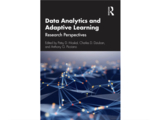Chem Prof, DoIT Staff Co-author Chapter in Analytics Book
UMBC case study focuses on "spaced practice" in Gen Chem
Earlier this semester, Taylor & Francis published Data Analytics & Adaptive Learning: Research Perspectives (2023), which includes a UMBC case study about Dr. Tara Carpenter's use of "spaced practice" in her high-enrollment, introductory course in general chemistry.
In "Banking on adaptive questions to nudge student responsibility for learning in general chemistry," Carpenter and DoIT staff co-authors John Fritz and Tom Penniston describe Carpenter's course redesign efforts using learning science, analytics, and adaptive learning technology to nudge students into deeper, long-term learning, application and retention instead of cramming and short-term memorization to prepare for her exams.
Abstract: In this case study from the University of Maryland, Baltimore County (UMBC), we explore if and how students can be nudged to take responsibility for their learning through one of the university's largest courses, CHEM 102 "Principles of Chemistry II." To do so, Tara Carpenter leveraged the campus' Blackboard learning management system (LMS) in Spring 2021, and then added the RealizeIt adaptive learning platform in Fall 2021 and Spring 2022 to implement a pedagogy of 'spaced practice," in which students have time to study, forget, re-acquire, and reorganize new knowledge or content. Specifically, Carpenter leveraged large pools or "banks" of questions to guide students in their "time on task" practice and application of key concepts needed to perform well on high-stakes, summative exams.
Overall, in comparing CHEM 102 final grade data between Fall 2020 and Fall 2021, we see that there is not a statistically significant relationship between the treatment (i.e., course design) and reduced DFW (drop, fail, or withdraw) rates. However, if we disaggregate final grade data, we see there is an overall statistically significant increase in As (p < 0.01) and decrease in Cs (p < 0.05) and Ds (p < 0.05). Notably, all of this gain from increasing As appears to be from students of color (SOC), who demonstrate a nearly 4x advantage over their nonredesigned course peers in attaining this grade (p < 0.001), while White students demonstrated no statistically significant gain in this area. Based solely on whether students used the spaced practice environment Carpenter designed, we also see that a model predicting final grades after only 14 days into the semester is 83% accurate.
The campus community can view the chapter here (UMBC account login req'd) or view Carpenter's 2022 presentation of related findings as part of the Learning Analytics Community of Practice.
By John Fritz
Posted: November 21, 2023, 7:16 AM
